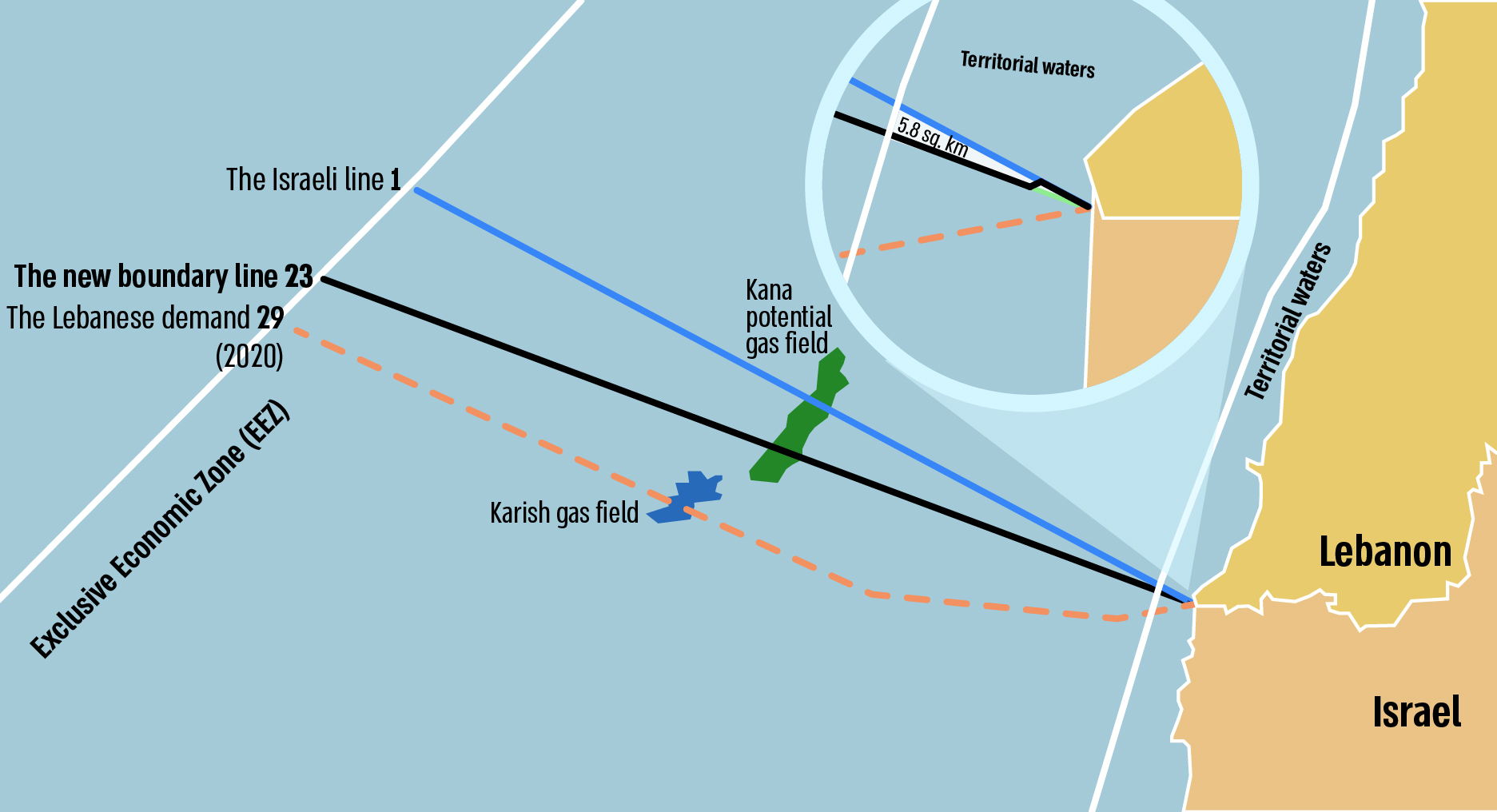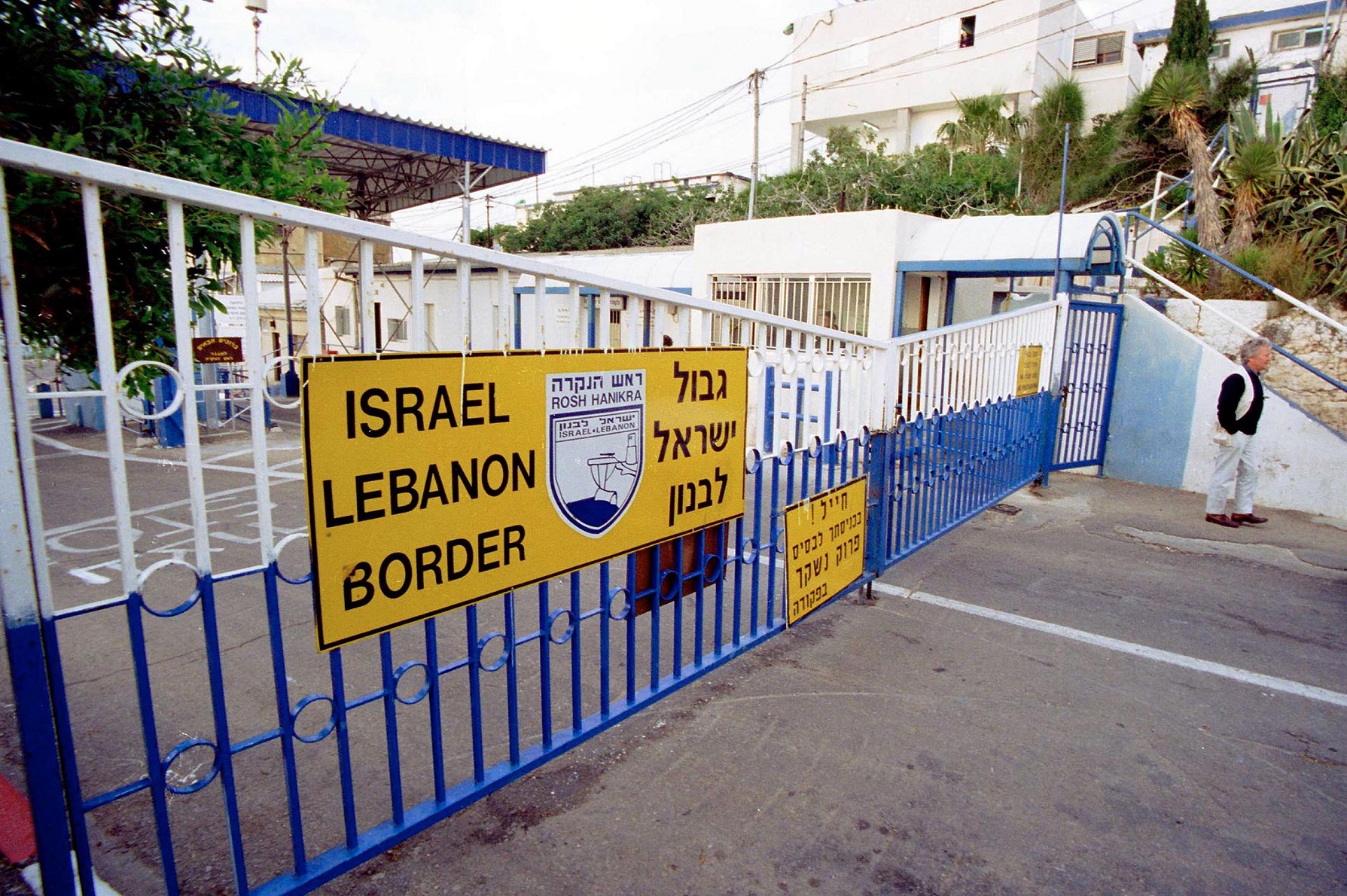Publications
INSS Insight No. 1652, October 25, 2022
A review of the maritime border agreement between Israel and Lebanon reveals an agreement that both reflects a compromise between the two parties and creates a win-win situation. Its achievement is a milestone in the history of the relations between the two states and serves their respective economic, security, and strategic interests. For Israel, in any case, the advantages clearly outweigh the disadvantages, and it is scheduled to be signed on October 27, 2022, after its approval by the Israeli government.
In early October 2022 United States mediator Amos Hochstein submitted the final compromise proposal for an agreement between Israel and Lebanon on the demarcation of their maritime border and gas production. But only on October 11, after the conclusion of the final round of pressure leveled by the parties – last-minute Lebanese demands for amendments to the wording, which were rejected by Israel; an Israeli decision to begin reverse flow testing in the Karish field (checking the pipeline prior to beginning the production process) – was it announced by Israeli Prime Minister Yair Lapid and Lebanese President Michel Aoun that the final version was acceptable to them and they would submit it for final authorization by their respective countries. The following day the Israeli cabinet and government approved the agreement, and the government decided (despite this not being the preferred option of the Attorney General) that the agreement would not be brought to the Knesset for authorization, but rather presented to it for two weeks, after which the government would give its final authorization.
What Enabled the Agreement?
Reaching the agreement became possible first and foremost due to the change this past June in the Lebanese stance. Lebanon is in the midst of an economic collapse and a deep political crisis. With the arrival of the Karish gas rig in Israel on June 5, Hochstein was called to Beirut, which relinquished its maximalist demand (Line 29) and presented a compromise position and a willingness to complete the deal soon. Nasrallah’s threats and action (UAVs sent over the Karish field on June 29 and July 2 and threats during July and August that the organization would attack the rig) also contributed, raising security tensions and concerns of military escalation. Furthermore, with the forthcoming elections in Israel and the approach of the end of the Lebanese President’s term on October 31, there was a sense of a limited window of opportunity that should be utilized. An additional contribution was Hochstein’s focus on what was most important to each of the sides, so that both would have a sense of achievement.
The Contents of the Agreement
In light of Lebanon’s refusal to engage in direct talks with Israel, the agreement is formulated as a letter from the United States to the parties that includes all of the clauses that were agreed upon and the procedure for implementation. The principles set in the agreement are:
- Maritime border demarcation: The two sides agree on marking a “permanent and equitable boundary,” based on Line 23 (which Lebanon claimed once again after it withdrew its demand for Line 29). In the first 5 kilometers adjacent to the coast, the current status quo will be maintained, in accordance with the buoy line that Israel marked in the wake of its withdrawal from Lebanon in the year 2000 (this was a demand on which Israel was unwilling to compromise for security reasons). Here section E1 is important: it determines that the parties agree that the demarcated boundary is a “permanent and equitable boundary” that resolves the maritime dispute between them, including with regard to the clause stating that the first 5 kilometers will be set along the current buoy line. As such, this dispute cannot be reopened in the future. Regarding implications for demarcating the land border, it was stated that the demarcation of the maritime border will not affect the land border. Israel did cede a majority of the disputed area between Line 1 and Line 23 (860 square kilometers) but most of this area is in its Exclusive Economic Zone (EEZ) and in practice Israel gave up only 5.8 square kilometers of territorial waters.

- Gas Production: The Karish field itself is not mentioned given that it is entirely in Israel's EEZ and presumably there is nothing preventing Israel from operating it. At the same time, it is noted that Lebanon has full rights to the potential Sidon-Kana gas field, which at its tip crosses into the Israeli side. The search there for gas will be conducted by a reliable international consortium that meets high professional standards and does not face international sanctions and will begin immediately after the agreement is signed. Israel will receive compensation in exchange for the part of the field that lies in its EEZ. The extent of the compensation will be agreed upon in negotiation between Israel and the consortium that will operate in Sidon-Kana (which will be led by the French company Total and supported by the government of France) and will be anchored in a financial agreement, prior to the beginning of the search. Lebanon will not have contact with this compensation or obligation to give it. The consortium will be given the opportunity to drill as needed on the Israeli side, only after authorization by Israel.
- Central US Role: The US commits to maximum efforts to mediate between Israel and Lebanon, and to transmit information and messages between the states and mediate in the event that disputes arise regarding the implementation of the agreement, or if additional gas fields are discovered in this space. A US commitment to assist Lebanon with its gas activity immediately and on an ongoing basis is also noted without further details (this likely refers to efforts to promote the deal to transport gas from Egypt to Lebanon via the Arab pipeline that runs through Jordan and Syria). In the agreement made public there is no description of US guarantees toward Israel, which apparently include security guarantees and guarantees to prevent the transfer of gas production revenues from Sidon-Kana to Hezbollah.
- Bilateral Relations: The agreement itself contains no mention of the essence of Israel-Lebanon relations, except for the definition that they agree permanently to the demarcation of the maritime border between them. This can be seen as Lebanese recognition of Israel.
- Procedural Aspects of Implementation: It was determined that after the agreement is approved in Israel and in Lebanon, the two sides will respond in letters to the United States stating that the principles of the agreement are acceptable to them and will each separately submit to the United Nations the maritime border agreed between them, which will replace their previous submissions on this matter. The agreement will go into effect on the day the United States sends a letter confirming that the two states have carried out these actions. At this stage it appears that the option mentioned in the agreement that there will be a signing event in Naqoura between officials at the professional rank sponsored by the UN will occur on October 27.
Ramifications of the Agreement for Israel and Lebanon
In examining the agreement, it is clear that it provides gains for both sides, notwithstanding their respective compromises, and in some areas – primarily in its contribution to regional stability and security – even serves mutual interests:
- On the economic level: Lebanon can finally and immediately move forward with gas searches in the Sidon-Kana field, where until now no international body has agreed to work so long as the maritime border dispute remained unresolved. If gas is actually discovered in this field, production there will only begin in a few years’ time, so that there will not be immediate economic profit for Lebanon. However, the agreement offers hope for the Lebanese people and brings tidings of stability and quiet in this area, and in turn may bring further investments and speed up international assistance to Lebanon, which has been delayed until now. Furthermore, the agreement improves the collapsing state of Lebanon’s chances of joining the club of gas-producing countries in the Middle East. Israel is promised financial compensation for the portion of the field that lies in its space. In the agreement the percentage of the compensation is not mentioned, but the press has talked about at least 17 percent – lower than what Israel was willing to agree to in the past, but nonetheless revenues it would not have without the current agreement. Furthermore, there are also economic benefits for Israel from the maritime stability and security that the agreement promises, such as attracting investors and lowering security and insurance costs.
- On the security level: For Israel, the agreement does not in any way harm the IDF’s defense capabilities at sea. The 5 kilometer buoy line is maintained, while ceding territory in the EEZ has no impact on the capabilities of the navy or intelligence that operate from a distance. Furthermore, the agreement may reduce the potential for violence incidents in the maritime space in which Hezbollah is involved, as it will not want to harm to chances of gas production at Sidon-Kana. However, the possibility of confrontation with Hezbollah in other spaces remains, considering Hezbollah’s increased confidence due to the agreement, which it claims to have achieved following the threats it issued. Despite not being interested in war, it may take the risk of a limited confrontation with Israel that could lead to escalation.
- On the strategic level:
- Vis-à-vis Lebanon: Despite the indirect talks and the Lebanese effort to prevent any sign of normalization, due to Hezbollah’s determined opposition, the agreement reflects a fundamental change in the relations between the two states. It pulls the rug out from under Hezbollah’s claims that Israel is an illegitimate entity that should not be recognized; proves that Hezbollah is not omnipotent in Lebanon and is also forced to compromise; and may contribute to a positive change in the Lebanese public’s perception of Israel and create an opening for future progress in relations. In addition, security stability and an improved domestic situation in Lebanon are important for Israel too.
- The status of Hezbollah: Although the agreement was presented to Hezbollah’s supporters as proof of the importance of Hezbollah’s resistance and its weapons to defend Lebanon, in practice it is likely to appear as an additional instance in which Hezbollah was forced to compromise. Hezbollah is subject to increased domestic criticism; it is struggling to influence the formation of the government (which since the elections in May is still functioning as a caretaker government) and force the selection of a president it supports.
- Vis-à-vis Iran, which opposes any agreement with Israel, the agreement represents an additional failure in its confrontation with Israel, the “Little Satan”; it was also formulated by the United States, the “Great Satan.” Furthermore, the agreement represents another stumbling block in the way of Iran’s efforts, led by Hezbollah, to expand its foothold in Lebanon and advances Lebanon’s ties with the West (mainly the US and France), in opposition to Nasrallah’s vision of aligning Lebanon with the “Shiite axis.”
In conclusion, formulation of the maritime border agreement between Israel and Lebanon was possible thanks to a convergence of interests between the two states, and to their willingness to compromise in order to take advantage of a limited window of opportunity. The agreement entails compromise, but it creates a win-win situation between the states, and thus the chances that it will be implemented are quite promising.



